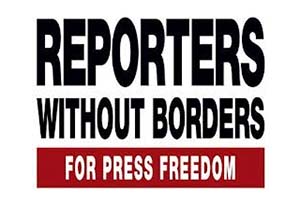
PARIS (Reporters Sans Frontières/Pacific Media Watch): Reporters Without Borders is outraged by the decision by the Micronesian island nation of Nauru, which hosts an Australian government detention centre for asylum-seekers, to increase the cost of a journalist visa from A$200 to A$8000 – an increase of nearly 4000 per cent.
“The new price of a visa is out of all proportion and is nothing less than ban on foreign media visits to this island state,” Reporters Without Borders said.
“This measure can have only one aim, to dissuade journalists from applying, because the $8000 dollars will not be reimbursed if the visa is refused. What media is going to risk such a sum? It is clear that the Australian government’s refugee detention centre is behind this decision.
“As with the detention centre on Manus Island, in Papua New Guinea, the Australian government is trying to censor any embarrassing information about the way it treats refugees. In the process of externalising the asylum-seeker issue, it is even managing to delegate responsibility for censorship and discriminatory measures against the media.
“We call on the authorities to rescind this measure outright, because it violates the constitution of Nauru and article 19 of the International Covenant on Civil and Political Rights, which Nauru has signed.”
Approved by Nauru’s parliament and due to take effect within days, the measure provides for no reimbursement of the $8000 if the visa application is rejected. An official said the hike was “for revenue purposes.”
Asylum seekers
The Sydney-based Global Mail online newspaper quoted a visa official as saying that only “three or four” media visas were granted in 2013 but that there was a big increase in media visas issued for a couple of months after Australia reintroduced offshore processing for asylum seekers in September 2012.
In November 2013, the UN Refugee Agency said the 700 asylum-seekers held at the Nauru detention centre were subjected to “harsh physical conditions” that “do not meet international standards.” Many human rights organisations have also criticised conditions at the centre.
Reporters Without Borders added: “This measure is a clear violation of the principle of freedom of information as enshrined in article 19 of the International Covenant on Civil and Political Rights and elsewhere.”
In its General Comment No. 44, the UN Human Rights Committee, which is responsible for interpreting the Covenant, said: “Limited accreditation schemes are permissible only where necessary to provide journalists with privileged access to certain places and/or events. Such schemes should be applied in a manner that is non-discriminatory and compatible with article 19 and other provisions of the Covenant, based on objective criteria and taking into account that journalism is a function shared by a wide range of actors.”
The committee also said: “It is normally incompatible with paragraph 3 to restrict the freedom of journalists and others who seek to exercise their freedom of expression (such as persons who wish to travel to human rights-related meetings) to travel outside the State party, to restrict the entry into the State party of foreign journalists to those from specified countries or to restrict freedom of movement of journalists and human rights investigators within the State party (including to conflict-affected locations, the sites of natural disasters and locations where there are allegations of human rights abuses).”
Reporters Without Borders has already criticised the Australian government’s policy of denying journalists access to its detention centres in 2011 and 2012. In the case of Nauru, the Australian government nonetheless continues to put its head in the sand and insist that it is an internal matter for the island’s government.
There was a violent riot at the Nauru detention centre after the Australian government announced that it was adopting tougher migration policies last July.
This work is licensed under a Creative Commons Attribution-NonCommercial 3.0 New Zealand Licence.




